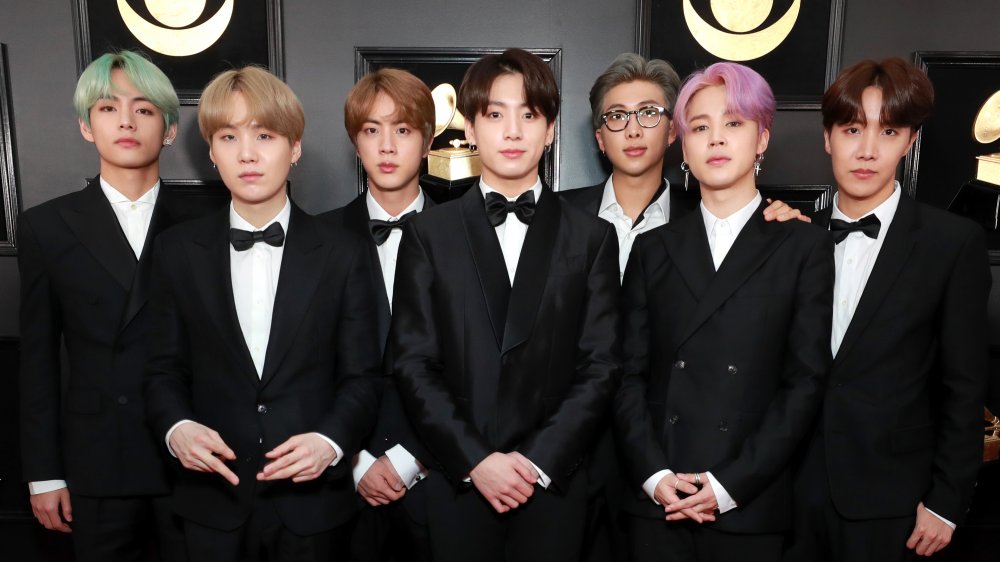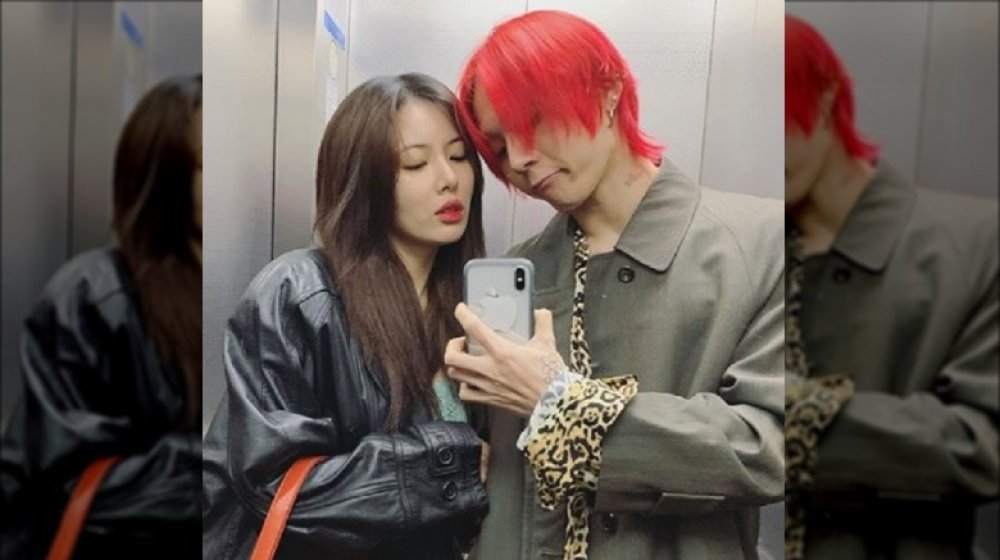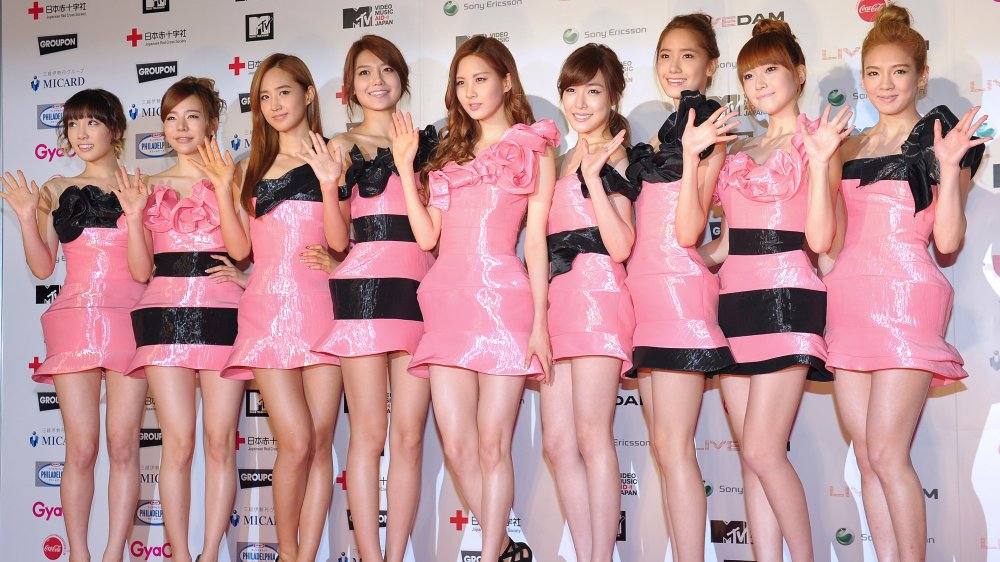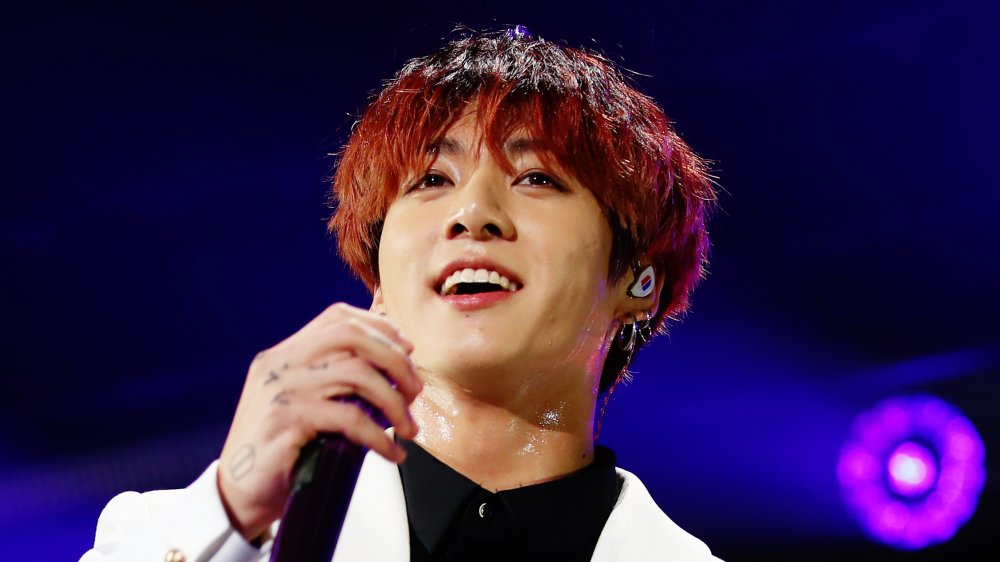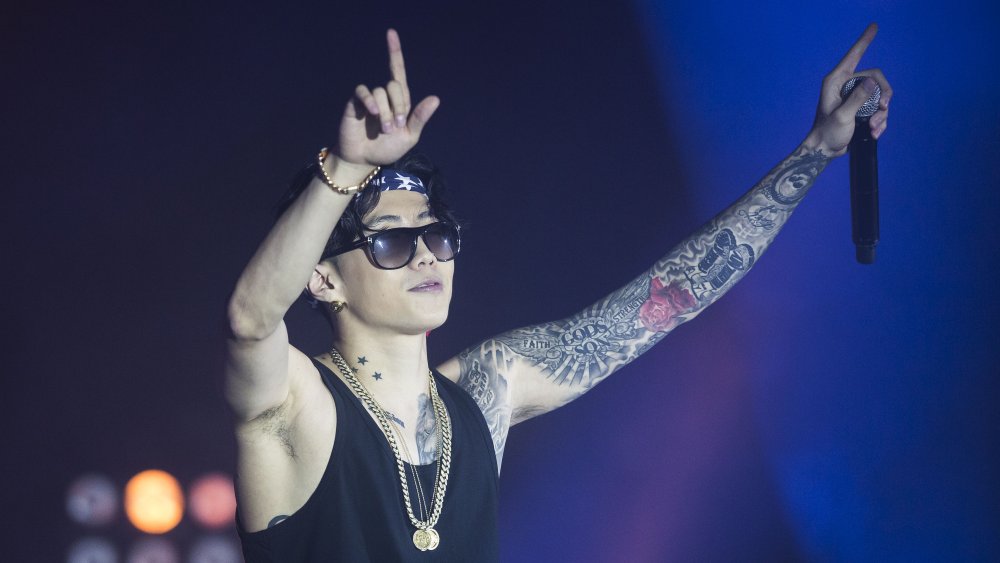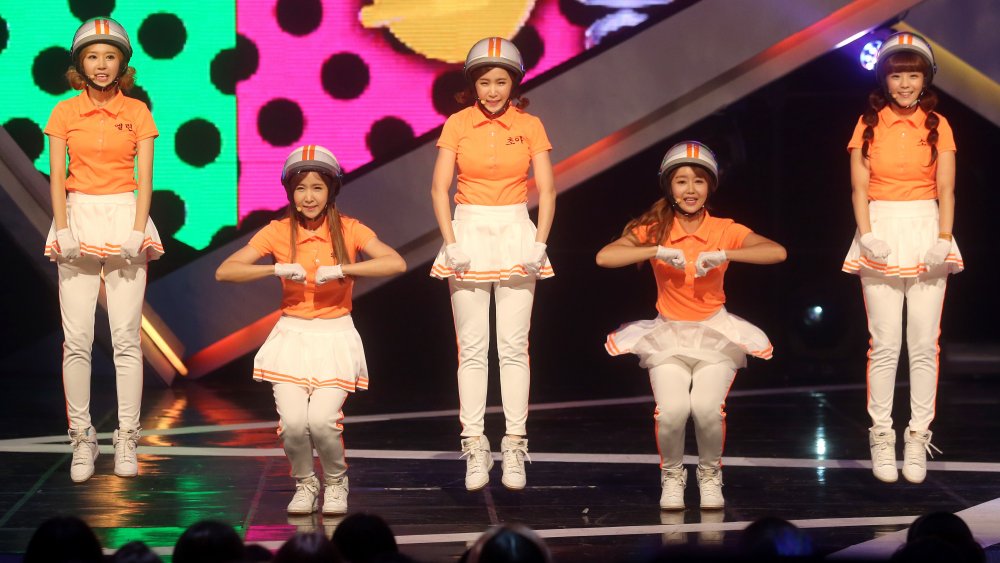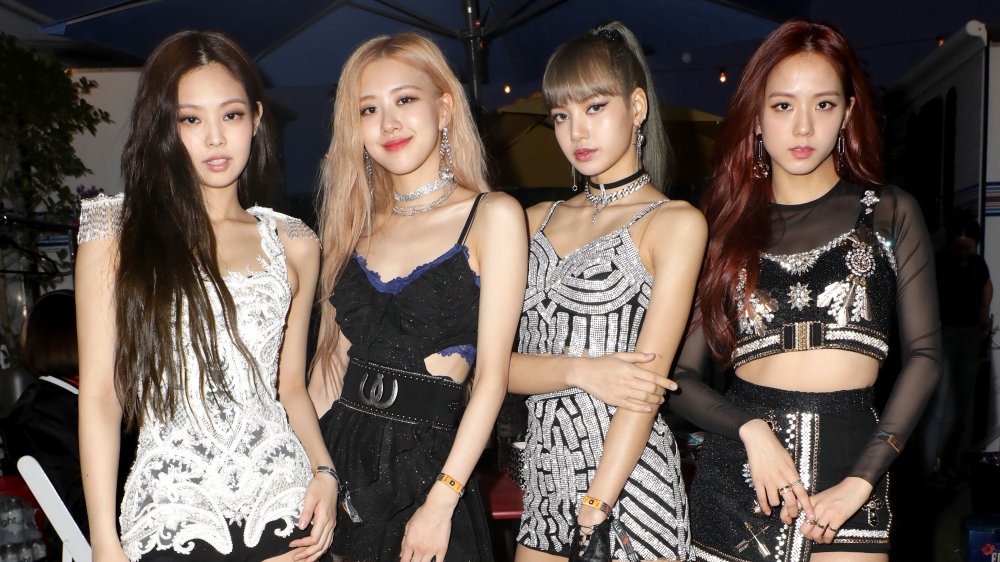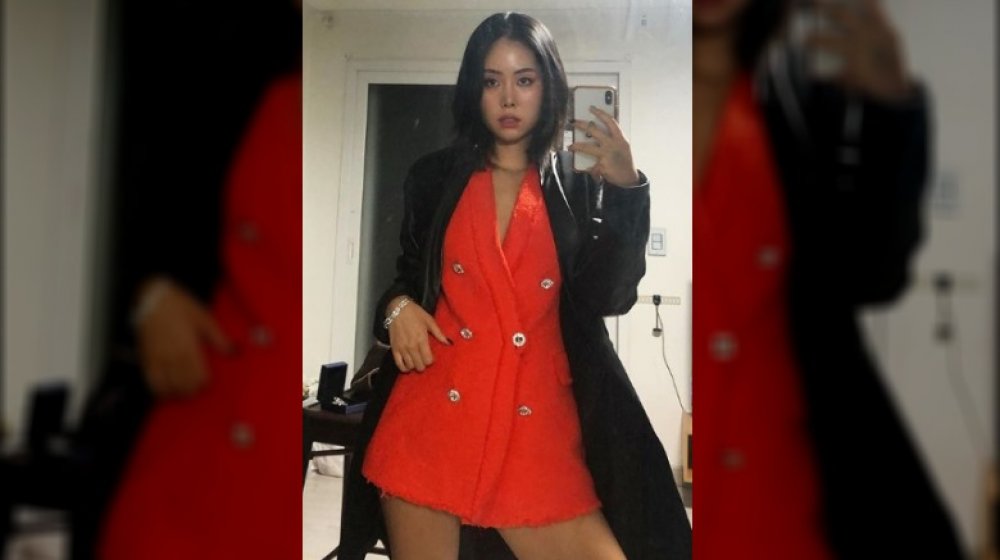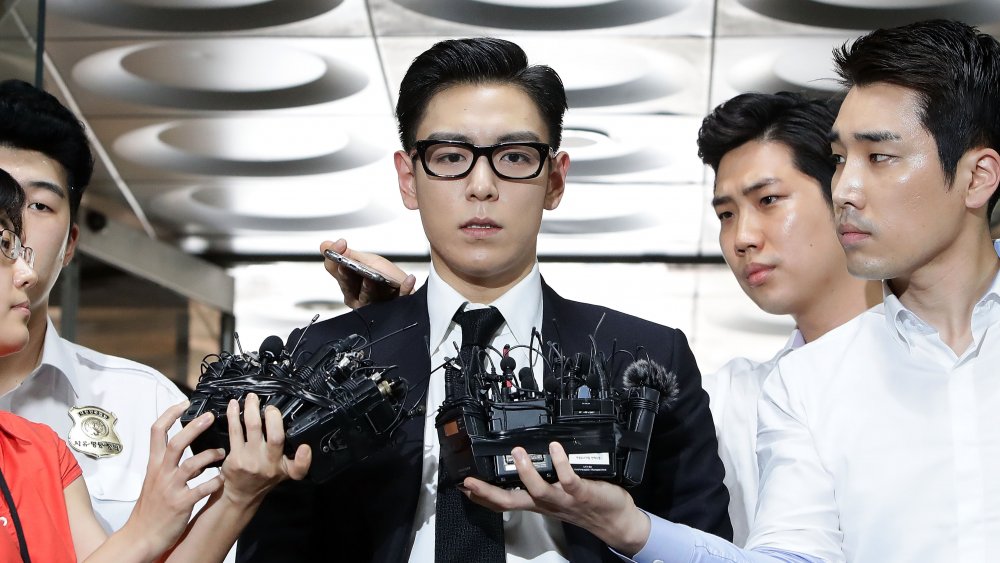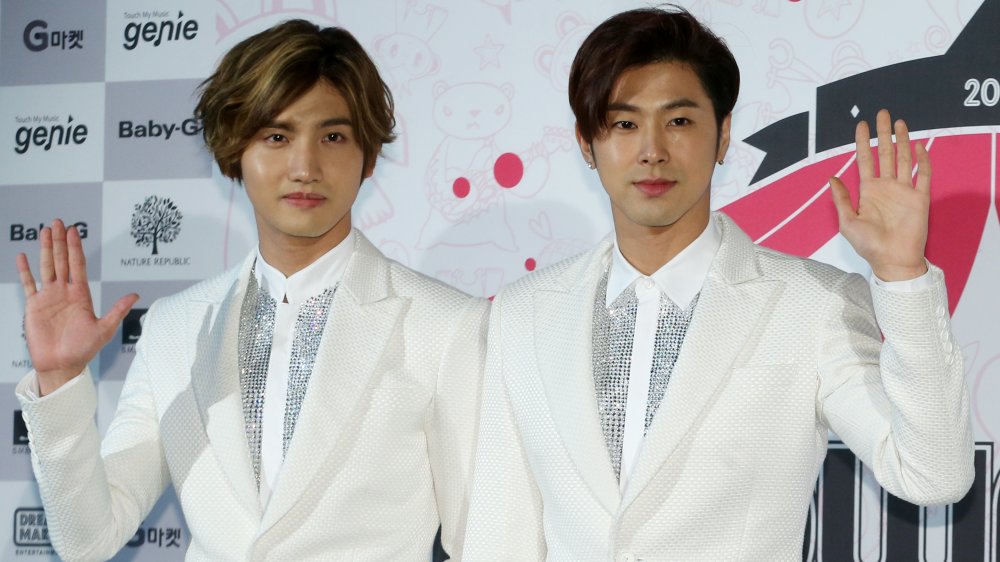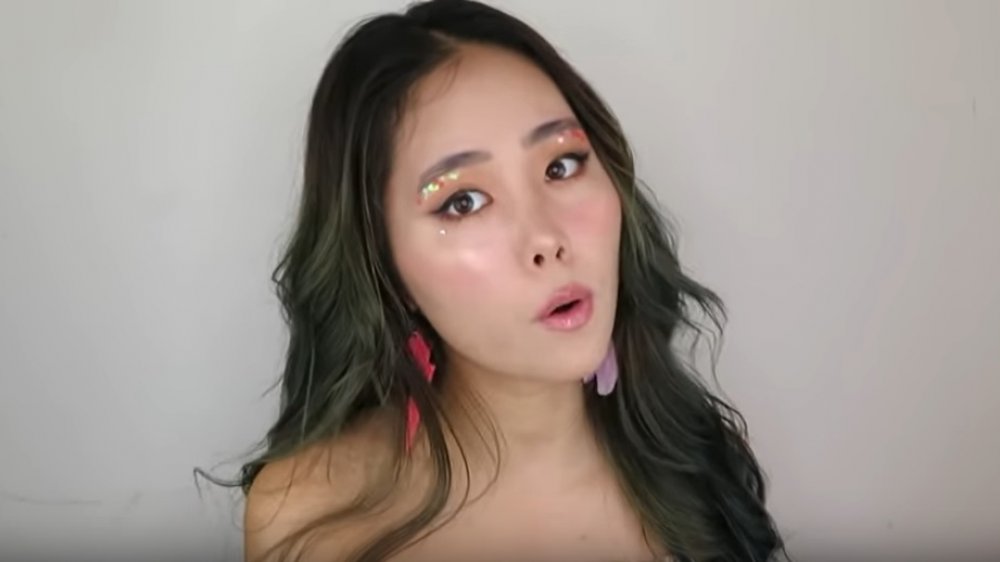Strict Rules That K-Pop Singers Have To Follow
According to Vox, K-Pop is a "global phenomenon that brings billions of dollars to South Korea each year. Launching its so-called "idols" into superstardom, K-pop allows performers who rise to the top of the highly competitive industry to earn the kind of fame and fortune that most people couldn't imagine. But that level of success comes at a price — a price that many would consider too high.
Those who choose the K-Pop life do what it takes to please the people who buy their albums, concert tickets, and every item of merch that's available. Eunice Chang, a production manager who is involved with K-pop events, appearances, and concerts, told CBC News, "[Idols] will do everything, anything for their fans because that's the only reason for them to exist." Chang also noted that K-Pop stars aren't likely to cause a fuss even when there's trouble. "[W]hen you are popular, you can not show your weak side," she explained. "People will say: 'Oh, you have everything. Why are you saying that?' They get a little judgmental."
Jeff Benjamin, a K-Pop music columnist, told the CBC that even the term "idol" adds to an extreme level of expectation, saying, "Just that word in itself gives the idea that they have to be perfect — they have to be the ideal standard of entertainer. That's a lot of pressure for a young person." That pressure seems even more extreme when you find out about the strict rules that K-Pop stars have to follow.
You won't find K-Pop stars on Tinder
K-Pop fans like their idols to be single — and female performers are preferably fully chaste — which is why they're not allowed to date. According to CNN, "some even having a 'no dating' clause in their contracts." Great Guys' Donghwi confirmed this, telling Insider, "We agreed not to have a girl in our lives, so we can focus more on our mission."
However, some stars naturally break this rule, like EXO's Chen, who announced in January 2020 that he not only has a girlfriend but that she's pregnant and they're getting married. Although revealing those facts wasn't an easy task for the star. "I don't know how to start this, and I'm very nervous," he wrote, according to Soompi. "I have a girlfriend I want to spend the rest of my life with. I was worried and concerned about the situations that would arise as a result of this decision, but ... I couldn't lose any more time thinking about when or how I should announce this, so I mustered up my courage."
Chen was right to think he needed courage because the truth can have serious consequences for K-Pop stars. CNN points out that "[w]hen it was revealed artists HyunA and E'Dawn (shown above) were a couple last month, there was an angry backlash from some apparently heartbroken fans, and the pair were subsequently suspended by their record label." So while the "no dating" rule may seem harsh, it may also be justified.
K-Pop stars can't hang out with friends of the opposite sex
The fact that K-Pop stars can't date may seem strict, but that's not where this situation ends. Frankly, K-Pop stars aren't even supposed to associate with people who don't share their gender. Former K-Pop artist and current YouTube personality Grazy Grace confirmed this by revealing that if she was "caught ... lounging around and talking to the opposite sex, like trainees and idols, [they] would always be separated." She even claimed that management companies would give them different schedules so that groups of guys and girls "would never run into each other or have any time to talk to each other."
While this might sound like another extreme precaution, it's a rule that's in place to appease fans who proved that they're serious about this situation in 2008 during a performance by Girls' Generation. While the group was on stage at an annual show in Seoul, "the crowd created a 'black ocean,' refusing to wave lights and cellphones and staying silent throughout the band's entire 10-minute performance, reportedly to protest how close the group had become to the members of boyband Super Junior," according to CNN.
Jenna Gibson, a Korea specialist at the University of Chicago, told CNN, "In a perverse way, because fans put in so much effort to promote and publicize a good image of their idol, some of them get the idea that they should have some say over the idol's actions and personal life."
The appearance of K-Pop stars is carefully managed
K-Pop stars may embrace headline-making colorful hair and signature styles of stage-worthy clothing, but each look has to be approved — and is usually selected — by their management company. Changing things up without permission is not allowed and will result in repercussions.
Granted, for most people, what they do with their appearance is their own business but when it comes to K-Pop stars, their appearance is their management's business — literally. Bernie Cho, a Korean music industry executive, told CNN, "K-Pop music is a big business and K-Pop bands not only endorse big brands but also become big time brands themselves. As a result, for better or for worse, individuals in such bands are viewed as investments." And just like any other big investment, it's not wise to make drastic changes without serious consideration. That means if BTS' Jungkook dyes his hair, it's a safe bet that his management knew about it well before his hairdresser whipped out the bleach.
If a K-Pop star did take their personal style into their own hands, it would mess up the carefully coordinated aesthetic of the typical K-Pop group, which depends on its adherence to the scene's preferences. Not to mention that an unapproved makeover could potentially upset fans who tend to analyze (and freak out over) every tiny change. This is definitely not a situation where you can express yourself without consequences coming at you from all sides.
K-Pop stars can't have (visible) tattoos
Part of keeping up the proper look for K-Pop stars means no visible tattoos. Yes, plenty of scene idols have their fair share of body art, but the fact is that they're supposed to keep the ink under wraps as much as possible (that is unless they fill the role of the rebel in the group). For instance, there's a good chance that Post Malone's many face tattoos wouldn't be tolerated by his management if the American rapper was a K-Pop performer.
In this case, the aesthetic rule isn't necessarily about fans' preferences but is instead about appeasing national media requirements. Inked explains, "While K-Pop stars are technically allowed to have tattoos, Korean television has yet to catch up with the trends and there are laws banning the showing of tattoos on screen. This is why you so often see K-Pop artists such as Block B's Taeil in oversized sweaters and covering their tattoos with tape."
"Not only that, but doctors are the only people who are legally allowed to do tattoos, which makes getting one from an artist is technically illegal in Korea," according to Inked. However, the outlet also notes that "there are still plenty of [tattoo] artists working underground" if a K-Pop star is inclined to risk some law-breaking body art. But even if they avoid a fine, they'll still have to deal with the other inconveniences and outcomes of opting for ink that's against the rules.
Staying in K-Pop star shape isn't easy
Staying fit isn't just necessary for K-Pop stars to be able to handle their active onstage routines, it's also a requirement that they need to fulfill in order to satisfy those in charge. That's why performers work out — a lot. Great Guys' Ho Ryeong told Insider, "Gym, studio, bedroom — that's my life circle." As the outlet observed, "It's a testament to the pressures of maintaining the intense beauty standards of the K-pop industry: idols must look and stay beautiful, young, and in good physical shape. That usually ends up in severe diet and exercise regimes."
Way, a former member of Crayon Pop, also talked to Insider about the physical demands of being in a K-Pop group, describing the intense practices that she used to take part in by saying, "We used to dance with 4 kg (8.8 lbs) of sandbags on our feet for several days. Our teacher wanted us to get used to the sandbags, so without it our dances would look lighter [in the performance]."
Metro notes that BTS also has a "grueling rehearsal routine" which "sees them practice for 12-15 hours a day." And that's not the lengthiest time K-Pop stars are willing to put in. According to i-D, "There are plenty of stories of trainees spending up to 20 hours a day practising; after their trainers depart, they'll keep practising or studying through the night."
Is the K-Pop star diet dangerous?
One of the darker aspects of K-Pop is the use of strict — and potentially dangerous — diets to help them stay slim and in shape. In order to make sure that idols remain the desired size, performers know that their management will be checking in. "Your company may weigh you," Koreaboo explains. "If you gain one or two pounds, your managers will hound you about your weight."
In an attempt to meet the body-related requirements, some singers rely on dangerous methods like using the Paper Cup Diet, according to Insider. A highly restricted meal-plan that consists of "nine paper cups — the size of the ones you'd find by water coolers — worth of whole grains, fruits, and vegetables," the diet is reportedly promoted by users of "pro-anorexia forums." If extreme diets don't work some stars end up "starving" themselves, according to the Korea Herald.
However, GreatGuys' Ho Ryeong told Insider that even though he can't eat what he wants when he wants, that's not usually an issue due to other priorities that K-Pop stars deal with. "Honestly, we don't have much time for eating. Nor are we free to eat what we want," he admitted. His bandmate, Jae I, added, "That's the hardest part. It's not easy to follow a diet, but [I suppose] it's not impossible either." It may not be impossible, but it doesn't sound like any fun, either.
K-Pop stars have to act respectfully
In many countries, being a star means that you can indulge in the kind of gross and shady behavior that others would never get away with. But being a star from Korea means that you have to be respectful at all times.
"You must greet your elders and bow at a 90-degree angle, and you must take the time to bow perfectly," according to Koreaboo. "[Grazy] Grace recounts a time when she bowed with her hands in her winter coat's pockets, because it was cold, and she was later scolded for being disrespectful." i-D backs this up by noting that "an idol standing on an awards stage with their hands in their pockets [will receive] accusations of bad manners/arrogance."
This strict protocol is also why most performers aren't allowed to have personal online platforms that they run themselves. "Some agencies allow their artists to have social media accounts, but the picture and caption are often micromanaged by managers who want to make sure you don't ... send the wrong message," Koreaboo explains.
Assistant Professor of Popular Culture in the Department of East Asian Studies of the University of Toronto Michelle Cho explains the reasoning behind the demand for respectful behavior by telling CTV News, "[K-pop idols] are understood to have a duty to the public to maintain high standards of morality and character — this is because, in general, pop culture, as a collective/mainstream culture, is supposed to have an edifying impact on society."
Partying is not part of a K-Pop star's life
When it comes to K-Pop stars, the "ideal idol has a moral record as unblemished as his pores, eschewing drugs, gambling, and public misbehavior of any kind," according to Bloomberg. Bernie Cho, a Korean music industry executive, explained the impact of an idol's iffy actions, telling CNN, "Scandals involving drinking [or] drugs ... not only make waves in the entertainment news section but also the finance news section because many of the biggest Korean music management companies are also publicly traded stocks on the Korean stock exchange. Sensational headlines can take a serious hit on the bottom line."
The expectation that K-Pop stars will stay away from certain substances is also why BIGBANG's T.O.P issued an apology when news broke in 2017 that he was being investigated by Seoul police over allegations that he had used marijuana, which is illegal in Korea, according to CNN. Taking to Facebook (via SBS) to take responsibility for his actions, the performer wrote that he had caused "great disappointment and disturbance with a huge wrongdoing" and went on to say that he had "left an irreparable scar in everyone's hearts" and "deserve[d] to be punished." He added, "My heart aches, and I am also very ashamed of myself. I will meditate and reflect on [my mistake] again and again. I will never make such an irresponsible mistake again. ... I will deeply repent my wrongdoing." It sounds like his regret was enough of a punishment.
K-Pop stars can't have second jobs
K-Pop stars at the top of the game may be bringing in big bucks, but many others are just barely managing to scrape by due to high costs and low pay. Unfortunately, rules in the scene mean that those who need to make extra cash are simply out of luck. Granted, trainees and rising performers don't really have time for a second job, but even if they want to have another source of income, they're not allowed to because it's against the rules.
Koreaboo explains, "While this depends on which company you're with, most companies don't want you to have a part-time job even though you might not earn enough as a trainee or recently debuted artist." The BBC even states that "some of K-Pop's biggest success stories were built on the back of so-called slave contracts, which tied its trainee-stars into long exclusive deals."
However, some people in the industry are trying to fight this unfair situation. Dong Bang Shin Ki even brought forth a lawsuit over what the group felt was an unfair contract. The group "took its management company to court, on the grounds that their 13-year-contract was too long, too restrictive, and gave them almost none of the profits from their success," according to the BBC. Fortunately, the group won their case, which led "the Fair Trade Commission to issue a 'model contract' to try to improve the deal artists got from their management companies."
K-Pop stars have to let their management check their cellphones
Not only do K-Pop stars have to follow all of the strict requirements that their management companies demand, but they must also follow another rule in order to prove that they're following the rest of the rules. To do this, performers have to be willing to hand over their cell phones so that their managers can take a look at what they've been up to.
"Managements [can] always check your phone at any time that they want," according to Grazy Grace. That's why she says that singers in the scene have to be prepared to be grilled over whatever is found — even if it's an innocent text message that might not be a problem in any other circumstance. Grace explains, "It could be your friggin' uncle and they might question who it is." She also says that performers sometimes attempt to delete "evidence" that might get them in trouble, however, those in charge stay one step ahead by conducting spontaneous checks.
When something is found on a K-Pop performer's phone that breaks the rules, Grace says the company will punish them by either making them train seven days a week (as opposed to the usual six), put a security camera in front of their dorm room, or take away their phone. It certainly sounds like you shouldn't embark on the world of K-Pop stardom unless you're willing and able to abide by some seemingly (overly or justifiably?) strict rules.

